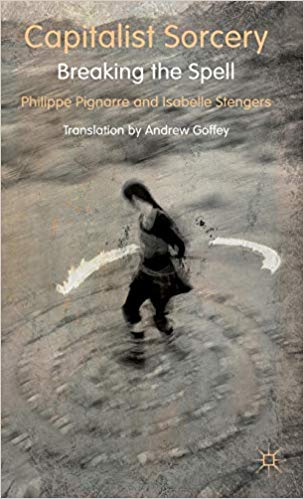«One should never trust the state. However, in the unhealthy milieu that is ours, this generality is not sufficient and one never pays enough attention. At every moment, oppositions can arise, backs can be pushed up against the wall, the separation of the pure and the traitors can appear as an obvious necessity. Thus, if one identified ‘not trusting the state’ with the imperative ‘only one path to salvation, that which escapes the state’, every definition of a situation would be taken hostage by this general imperative, the most formidable of all: that which arms those who are adept at purity. That is why we like the image of the interstice.» (p.110)
«An interstice is defined neither against nor in relation to the bloc to which it nevertheless belongs. It creates its own dimensions starting from concrete processes that confer on it its consistency and scope, what it concerns and who it concerns. What an interstice is capable of is an unknown [une inconnue], except that the notion of the interstice calls for the plural» (pp. 110-111)
«We are talking of a problem ‘that gathers together’, not of a problem to be resolved. Because one of the most deathly generalities is the confusion between the fabrication of the problem and its solution, such as is demanded by those who ask ‘but what are you proposing?’ Whoever poses this question situates themselves in the ‘bloc’, because it is a matter of asking the interstice, often with good will, what will allow it to be closed up again. However, not answering the question from outside but learning how to produce it in minoritarian terms at the heart of the interstice is part of its fabrication […] It is not for all that a matter of defining the state as the ‘enemy’, lending it a coherence, a personality that it doesn’t have. One always has to deal with functionaries working under the imperative of the ‘we have to’, but not all of them are ‘minions’. Tested by the existence of an interstice, that they may help or crush, certain of them are capable of hesitating, of being infected by a precarious sense of the possible. lt is at once both a chance and a trap. One must never trust in the good will of those who are and remain agents of the organs of the state, but to put them up against the wall, to ask them openly to betray, is to contribute to turning them into ‘minions’.» (p.112)
«A politics of interstices should therefore refrain from any general judgement bearing on the difference between interstice and bloc, between the ‘true’ interstice and those that have been ‘recuperated’. The fabrication of each interstice creates its milieu, the manner in which its ‘interior’ and its ‘exterior’ are distinguished, at its own risk […] What was an interstice has then become an ‘organ’, giving the state new possibilities for perception and action. But the question of the progress report can itself become the matter of a successful political fabrication. The interstice has then been the occasion that provides the test that succeeds in creating a difference between zealous ‘minions’ of the state and those who, thanks to it, have the experience that it is possible for them to become part of the process in their own way – here, accepting a report they know is ‘fabricated’. And that without having to make a heroic choice, the imposition of which takes hostage and allows the ‘pure’ and the ‘damned’ to be opposed […] Interstices are often born from a rupture, but they can also be born from an operation of repair.» (p.113)
«A very interesting interstice has opened up in the bloc of sociologists professionally dedicated to the role of interpreters of the ‘public perception of risks’. That is to say, in cruder terms, to the role of specialists distributing the various ways that the public has of ‘imagining’ that there are risks, according to the relevant parameters. Certain sociologists took the opportunity of a study of the perception of risk to put to work consultation apparatuses able to favour the processes of the construction of positions and questions, thus breaking with the definition of a science that has to ‘explain’ public opinion in terms of influence, habitus and relations of domination […] A new generation of minions is being prepared, those who will be the ‘co-ordinators’ who will ‘responsibilise’, who will ‘structure the debate’, who will ‘promote consensus’. We say that those who object in this way contribute to the closure of the microfissure, to the perpetuation of the anti-politics of the probable, against the political creation of the possible» (p.114)
«lnterstices need to be protected against the posturing of a hope that lends them a role in search of an actor, and constitutes them as the hostages of this role» (p.115)
– Pignarre, P., & Stengers, I. (2011). Capitalist Sorcery: Breaking the Spell. New York: Palgrave Macmillan.
